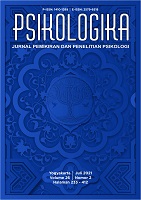Main Article Content
Abstract
Numeracy is one of the most necessary skills needed. However, not every student has sufficient numeracy, therefore it is needed an effective intervention to improve students’ mathematics skill. The widely use of technology in education has provided a breakthrough for conducting digital-based interventions in learning mathematics. This study goal is to review the literature which measures the effectiveness of digital-based intervention to improve mathematics skill. Meta-analysis done to eighteen journals published in the past decade with 1,721 participants of experiment group and 1,219 participants of control groups which are relevant to this study. Based on mean differences (M, SD, and n) analysis, it is found that the effect size was g = .492 (95% CI = [.287, .706]; p < .001; I2 (inconsistency) = 84.43%). This shows that the effect size obtained is similar to Benavides-Varela et al. (2020) study which found digital-based interventions are effective to improve dyscalculia students’ mathematics skill. There is also no evidence which shows level of education affects the use of digital intervention to improve students’ mathematics skill (p = .359). The effect size obtained while using level of education as moderator is g =.398 (95% CI = [-.483, .175]; p < .001; I2 (inconsistency) = 84.02%). Therefore, educators can use digital media as a tool to support students’ mathematics learning, both at the preschool to college level.
Article Details
Authors who publish with this journal agree to the following terms:
- Authors retain copyright and grant the journal right of first publication with the work simultaneously licensed under a Creative Commons Attribution-ShareAlike 4.0 International License that allows others to share the work with an acknowledgment of the work's authorship and initial publication in this journal.
- Authors are able to enter into separate, additional contractual arrangements for the non-exclusive distribution of the journal's published version of the work (e.g., post it to an institutional repository or publish it in a book), with an acknowledgment of its initial publication in this journal.
- Authors are permitted and encouraged to post their work online (e.g., in institutional repositories or on their website) prior to and during the submission process, as it can lead to productive exchanges, as well as earlier and greater citation of published work (See The Effect of Open Access).




